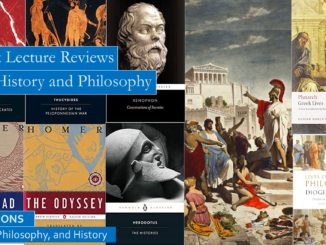
Book and Lecture Reviews of Ancient Greek History and Philosophy
Since we seek to draw moral lessons from history, we favor the Lives of Great Greeks and Romans by Plutarch. […]

Since we seek to draw moral lessons from history, we favor the Lives of Great Greeks and Romans by Plutarch. […]
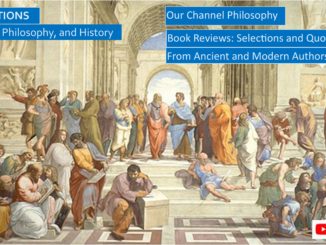
To a Stoic Philosopher, the question of Theodicy, or why God permits bad things to happen to good people, why God permits suffering, is simply absurd. The fact is, we do suffer, we will face injustices, we will suffer illnesses and death, and the rain falls on both the good man and the bad man. God will not shield us from suffering and injustice, but God will provide us with the strength to endure the challenges of this life. […]
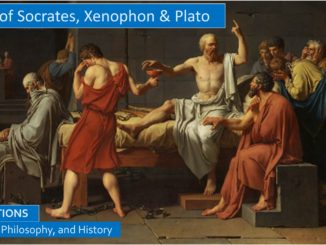
These works on the trial and execution of Socrates by Xenophon and Plato testify to their anger at the citizens of Athens for condemning their gadfly teacher and friend. Xenophon and Plato also show their anger at Socrates for the hubris and arrogance displayed in full force in his trial speech and his sentencing speech. They want to remind us that just as the Homeric heroes of the battle of Troy showed their hubris at the battlefield, so too did their hero Socrates show hubris in the public courtroom of Athens. […]
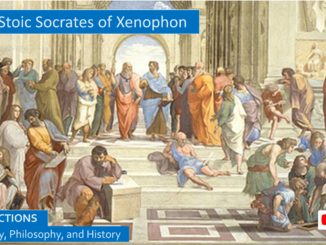
Xenophon’s Socrates definitely sounds Stoic, he sought to die the good Stoic death. “Socrates was so arrogant in court that he invited the juror’s ill-will and more or less forced them to condemn him. His fate was proper to one loved by the gods, because he both avoided the most difficult part of life and gained the easiest of deaths. His fortitude was obvious, since he decided death was the better option, he showed no weakness in the face of death, but awaited it cheerfully.” […]

In the end of his speech to the jurors who will decide whether he will live or die, he says, “Judges, be of good cheer about death, and know for certain that no evil can happen to a good man, either in life or after death.” Socrates is forgiving. “I am not angry with my condemners, or with my accusers; they have done me no harm. Although the did not mean to do me any good; for this I gently blame them.” […]

How do you encourage your neighbor to grow in wisdom without preaching to him? The Platonic method is the dialectic, the Socratic Dialogue, questions and answers to encourage the citizen to think. The method used by the Gospels is the parable, similar in function to the Delphic Oracle, that also entices the listener to think through questions of right and wrong, justice and virtue. Plato does not use parables as often, but he does use parables very effectively, the most famous parable in the history of philosophy is his Allegory of the Cave in the Republic. […]
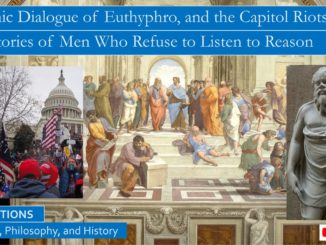
Socrates has been charged by the citizens of Athens of impiety, of corrupting the youth, and in preparation he must go to the porch of the King Archon. There he meets his friend, Euthyphro, and they converse about the serious charges filed against Socrates, and the serious charges Euthyphro intends against, surprisingly, his very own father. Socrates senses that his friend has little idea of the consequences of this action, and that his youthful haste may lead to a miserable and penurious future, and that his friend has pondered little of this drastic action. […]
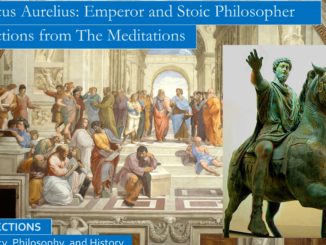
The Meditations admonish us, Do not be lazy! But then he says sometimes it is necessary to rest, but not in excess. Do not rest or eat or drink more than is sufficient, “so you do not love yourself.” What does a good emperor advise us, and also his successors? “Show those qualities that are altogether in your power: sincerity, gravity, endurance of labor, aversion to pleasure, contentment with what you have and with a simple life, benevolence, frankness, no love of frills, freedom from trifling magnanimity.” Do not grumble, do not be stingy, do not flatter, do not try to please men or show off. […]

Marcus Aurelius advises us in Book II to “begin the morning by saying to yourself, I shall meet with the busybody, the ungrateful, arrogant, deceitful, envious, unsocial. All these things happen to them because they are ignorant of what is good and evil. . . I can neither be injured by any of these, for no one can force me to be ugly, nor can I be angry with my kinsman, nor hate him. […]
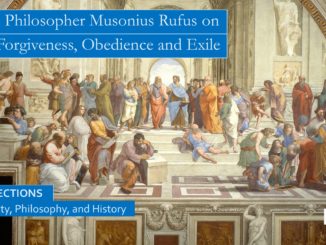
Rufus asks, like a good stoic, Why should the exile lament of his condition, why should he complain, how is he oppressed? Has he been exiled from the warmth of sun, has he been exiled from being refreshed by the rain, has he been excluded from the society of men? Rufus adds that in exile we may associate with our friends, our true friends, those friends “who would never betray or abandon us,” but those who shun us are not true friends, we are better off without those who are not truly friends. The most important question Rufus asks is, “How can exile be an obstacle to the . . . acquisition of virtue, when no one was ever hindered from the knowledge and practice of what is needful because of exile?” Rufus dismisses those who insist that exiles are the worse off when they also lose their freedom of speech. Nonsense, Rufus says, for you never truly lose your freedom of speech, for nobody can ever take away your freedom of thought, and if you do not feel free to speak out against injustice or impiety, you are not limited by lack of freedom, you are reined back by FEAR. To the truly courageous who insist on speaking out, the truly courageous who fear neither pain nor punishment nor death, how can they lose their freedom? They are truly free.
We must truly be thankful of all our fortunes and misfortunes, for neither keeps us from seeking virtue, and both can aid us in our journey towards greater virtue, towards salvation, towards the working out of our salvation, for what else does working out our salvation mean, if it does not mean that we work out our salvation through both our blessings and our sufferings? […]
Copyright 2017